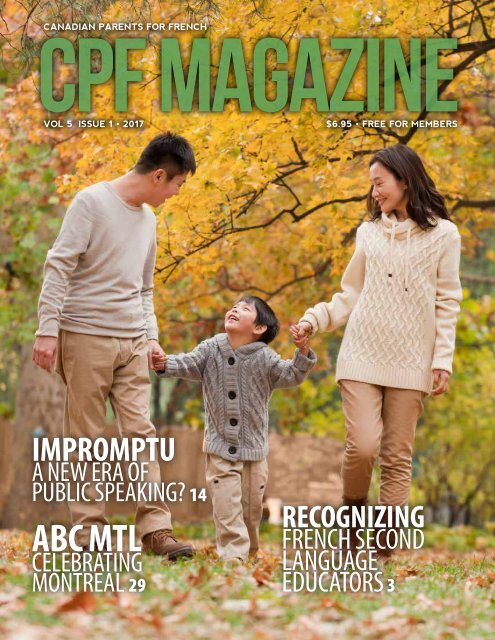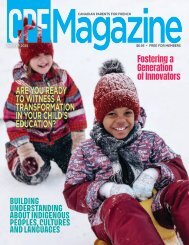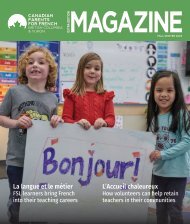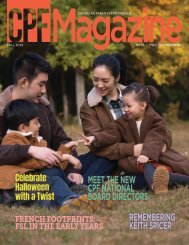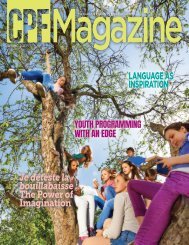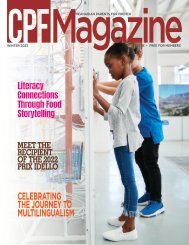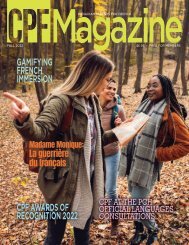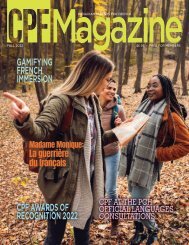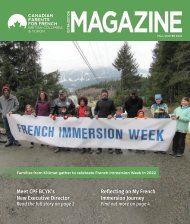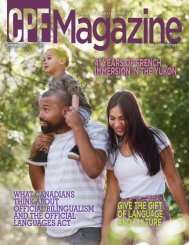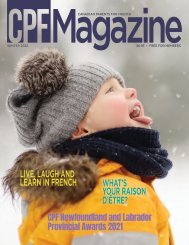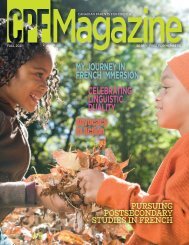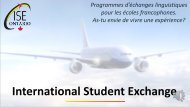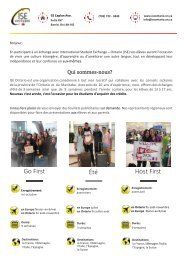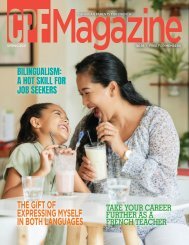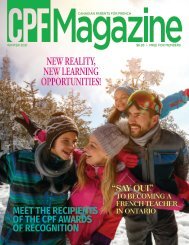CPFMagazine_FALL2017_Vol5Issue1_eVERSION
A national network of volunteers, parents and stakeholders who value French as an integral part of Canada. CPF Magazine is dedicated to the promotion and creation of French-second-language learning opportunities for young Canadians.
A national network of volunteers, parents and stakeholders who value French as an integral part of Canada. CPF Magazine is dedicated to the promotion and creation of French-second-language learning opportunities for young Canadians.
You also want an ePaper? Increase the reach of your titles
YUMPU automatically turns print PDFs into web optimized ePapers that Google loves.
CANADIAN PARENTS FOR FRENCH<br />
CPF MAGAZINE<br />
VOL 5 ISSUE 1 • 2017<br />
$6.95 • Free for Members<br />
Impromptu<br />
a new era of<br />
public speaking? 14<br />
ABC MTL<br />
celebrating<br />
Montreal 29<br />
Recognizing<br />
French Second<br />
Language<br />
Educators 3
|||||||||||||||||||||||||||||||||||||||||||<br />
Announcing our all-new<br />
INTEGRATED<br />
FRENCH IMMERSION<br />
OPTION<br />
Starting in September 2017, you can earn<br />
a degree and learn French at the same time.<br />
Count French credits towards your program<br />
and graduate with no delay.<br />
FOR MORE INFORMATION<br />
www.usainteanne.ca<br />
$2000 scholarship<br />
guaranteed!<br />
In the context of today’s highly competitive<br />
job market, bilingualism is a valuable asset<br />
that opens doors to employment opportunities<br />
nationally and internationally. By living, studying,<br />
working and playing in French 24 hours a day,<br />
you will develop the confidence and proficiency<br />
you need to succeed.<br />
Hughie Batherson<br />
hughie.batherson@usainteanne.ca<br />
902-778-2864
cpf magazine<br />
canadian parents for french<br />
FALL/WINTER 2017 | vol 5 issue 1<br />
www.cpf.ca<br />
2<br />
3<br />
EDITORIAL COMMITTEE<br />
Michael Tryon, Gail Lecky,<br />
Nicole Thibault<br />
EDITORIAL MANAGER<br />
Shaunpal Jandu<br />
CONTRIBUTORS<br />
Shaunpal Jandu, Maryanne Bright, Joan<br />
Hawkins, Nicole Thibault and other authors<br />
and organizations, as noted in their articles.<br />
GRAPHIC DESIGN<br />
Stripe Graphics Ltd.<br />
PRINTING<br />
Trico Evolution<br />
SUBMISSIONS<br />
Editorial: Shaunpal Jandu<br />
Canadian Parents for French<br />
1104 - 170 Laurier Ave. W.<br />
Ottawa, ON K1P 5V5<br />
(613) 235-1481, www.cpf.ca<br />
Email: sjandu@cpf.ca<br />
Advertising: Cathy Stone<br />
Canadian Parents for French<br />
Email: advertise@cpf.ca<br />
CPF Magazine is published two times per<br />
year for members of Canadian Parents for<br />
French. Our readership includes parents<br />
of students learning French as a second<br />
language, French language teachers,<br />
school board or district staff, and provincial,<br />
territorial and federal government staff<br />
responsible for official languages education.<br />
CHANGE OF ADDRESS<br />
To signal a change of address, contact<br />
Canadian Parents for French at (613) 235-1481,<br />
or email: cpf.magazine@cpf.ca<br />
Editorial material contained in this<br />
publication may not be reproduced<br />
without permission.<br />
Publications Mail Agreement No. 40063218<br />
Return undeliverable mail to Canadian<br />
Parents for French at the address above.<br />
To become an online subscriber, email<br />
cpf.magazine@cpf.ca. For an online version<br />
of this issue, visit www.cpf.ca.<br />
5<br />
This issue of CPF Magazine is printed on<br />
70lb Creator Silk (10% PCW, FSC), using<br />
vegetable based inks. The paper is FSC certified<br />
by the Forest Stewardship Council® (FSC®),<br />
meaning it comes from well-managed forests<br />
and known sources, ensuring local communities<br />
benefit and sensitive areas are protected.<br />
4<br />
10<br />
Our Legacy A video on CPF<br />
Clockwise from top left:<br />
1. MP Randy Boissonnault keeping the crowed la<br />
the breakfast.<br />
2. CPF youth taking the time to talk about CPF<br />
3. Raissa Bado and CPF-MB President Rena Prefon<br />
about French for Life.<br />
4. A view of the packed Parliamentary Dining Ha<br />
breakfast.<br />
5. A serious conversation over non-alcoholic mim<br />
Hilaire Lemoine from the University of Ottawa<br />
MP from Charlottetown.<br />
6. CPF-BCYK President, Diane Tijman, the Honou<br />
Mobina Jaffer and the Senator’s aide stopped<br />
conversation to pose for the camera.<br />
featureS<br />
departments<br />
16<br />
CPF on Parliament Hill<br />
Recognizing FSL Educators 3<br />
Support for Post-Secondary Students Studying in their<br />
Second Official Language 7<br />
Linguistic (In)security, We Have to Talk About It… 8<br />
CPF Brings FSL Awareness to Parliament Hill 16<br />
Does the Candidate Have to Speak French to Become<br />
Prime Minister? 19<br />
CPF Youth Illustrate the Benefits of Bilingualism to Senators 22<br />
Adapt Intensive Core French to Educational Realities 25<br />
Au Plaisir de lire en français — Booking it in French 27<br />
Celebrating Montreal 29<br />
Message from the President 2<br />
CPF Programming: Our Legacy: A Video of How CPF Started 10<br />
CPF Programming: Concours d’art oratoire 12<br />
Branch Programming: Impromptu: A New Era of Public Speaking? 14<br />
CPF Research: The State of French Second Language<br />
Education in Canada 20<br />
Partner News: Discovering the History of Canada’s Official Languages 21<br />
Advertorial: What the “Phoneme”? 24<br />
Advertisers’ Directory 31<br />
Key CPF Contacts Across Canada 32<br />
Canadian Parents for French is the national network of volunteers which values French<br />
as an integral part of Canada and which is dedicated to the promotion and creation<br />
of FSL learning opportunities for young Canadians.<br />
We acknowledge the financial support of the Department<br />
of Canadian Heritage.
CPF MAGAZINE<br />
message FROM THE PRESIDENT<br />
O<br />
ver the summer, as I drove Alberta<br />
and Newfoundland highways, my<br />
thoughts centred on the significance<br />
of national organizations like Canadian<br />
Parents for French. In the crowded<br />
minutes and hours of all our lives, how<br />
do we gauge the effectiveness of that<br />
extra hour of organizing meetings, or<br />
the meeting with the provincial, federal<br />
legislator or school trustee to influence<br />
policy? When the national board meets<br />
on a summer long weekend in a hotel<br />
conference room for 7- 8 hours, we<br />
ask ourselves exactly that. The answer<br />
is creating a question to focus our<br />
discussion– what is the impact of our<br />
national board’s volunteer efforts on a<br />
CPF member.<br />
After a year of CPF Presidency at the<br />
national level, my perspective focuses on<br />
two realities.<br />
1. Canadian volunteers in the 21st<br />
century marketplace are in the driver’s<br />
seat and CPF is slow to adapt to this<br />
reality.<br />
2. Organizational management needs<br />
to leapfrog into a model of agility,<br />
proactive planning, and innovation<br />
accessing technology and adapting<br />
to a new reality of leadership.<br />
I recently read an email to members<br />
of a CPF Chapter that started out<br />
reasonably well. It invited members to<br />
the AGM and then it went on to state that<br />
unless parents came out to the AGM and<br />
accepted officers’ positions, the Chapter<br />
would fold and the repercussions were<br />
listed. How I wished I could pull that note<br />
out of our members’ inboxes! If you knew<br />
a party was being held by a neighbour you<br />
barely knew and the invitation basically<br />
implied that no one usually comes but it<br />
was being held for one last time just in<br />
case someone showed up. Would you<br />
mark your social calendar with a big must<br />
attend star? Likely not. But too often we<br />
talk about our volunteer association with<br />
CPF in a similar vein.<br />
So how about changing things up<br />
when we host events knowing that<br />
not everyone can manage a weekday<br />
Volunteerism is the backbone<br />
of many important initiatives<br />
in our country, but ways of<br />
operating effectively and<br />
efficiently have changed<br />
radically – CPF must as well.<br />
evening event? How about being able to<br />
call into the AGM and engage members<br />
who could be involved that way, or a<br />
meeting through internet conferencing<br />
applications? Recent graduates are often<br />
keen to ‘payback’ as they go out into the<br />
‘real’ world and realize the enormous<br />
benefit of being bilingual. They can<br />
volunteer AND bring their technological<br />
capacity to our ‘cause’.<br />
Because of the heavy reliance on<br />
public funding, we tend to focus on<br />
people who have the capacity to manage<br />
the needed reporting requirements.<br />
This absolutely needs to be within<br />
their competency or the ability to lead<br />
volunteers and/or staff to undertake it.<br />
But what is really needed is the ability<br />
to leverage communication technology,<br />
grasp persuasive writing and public<br />
speaking skills. People who can ‘sell’<br />
the value of a bilingual education from<br />
either their own experience, or from<br />
the experience of parenting children<br />
who are well on their way to enriched<br />
lives because they are bilingual. We<br />
need parents to share the facts and<br />
experiences. We need leaders to excite<br />
parent volunteers, attract new members,<br />
position CPF Chapters as great ways to<br />
meet new friends and be involved in their<br />
child’s educational life, and to support<br />
teachers who want their students to<br />
succeed. CPF needs leaders.<br />
Everyone already knows that change<br />
is hard and challenging. All of us adapt –<br />
we’ve had to. Adapting CPF to the reality<br />
that volunteerism and volunteers are<br />
clearly telling us that we need to explore<br />
a new approach to engagement and that<br />
leadership in the nonprofit sector needs<br />
to mirror models of success—adaptability,<br />
technical literacy, concepts of supply and<br />
demand in the marketplace of human<br />
interests and capacity—are essential.<br />
I appreciate the learning experience<br />
and the opportunity to share leadership<br />
insights to shape, adapt, and inform CPF<br />
National over the last three and a half<br />
years. For whatever value I contributed is<br />
entirely due to the immense contributions<br />
of my fellow board members, the two<br />
Presidents with whom I have served, and<br />
the strength of the National Executive<br />
Director and her staff. I also want to<br />
acknowledge the tireless efforts of Tony<br />
Orlando, (President, CPF Nova Scotia) as<br />
Chair of the Council of Presidents. As I<br />
retire from the National Board. I thank<br />
you for the privilege of having served with<br />
you. Where could we make an even more<br />
significant impact? n<br />
Karen Lynch<br />
President<br />
CPF National<br />
2016-2017<br />
2 Canadian Parents for French Vol 5 • Issue 1 • 2017
Recognizing FSL<br />
Educators<br />
Teachers interviewed by Maryanne Bright, Communications Coordinator, CPF National<br />
Canadian Parents for French Profiles Exemplary FSL Teachers from Across Canada<br />
As an organization that supports the advancement and promotion of linguistic duality for Canada’s youth, we want<br />
to recognize the outstanding contributions of French as a second language (FSL) teachers from across the country.<br />
Day in and day out, with unwavering passion, they have chosen to do what is needed to ensure youth have the<br />
opportunity to acquire the skills necessary to lead successful and fulfilling bilingual lives.<br />
To recognize them, we are profiling 13 of these dedicated FSL educators from coast to coast to coast.<br />
We know that our vision comes to life through the everyday efforts of countless teachers like these,<br />
who work to inspire and remind us that making a difference takes time but that every little bit counts!<br />
In this issue, we profile four of the teachers interviewed: Glen Melanson from Nova Scotia, Greg Mountenay<br />
from Ontario, Michele Thoms from Northwest Territories and Kimberly Gromko from Quebec.<br />
Continue reading CPF Magazine to learn about other teachers from your part of Canada and their unique experiences<br />
– changing the face of bilingualism.<br />
Canadian Parents for French Vol 5 • Issue 1 • 2017 3
Glen Melanson<br />
Nova Scotia<br />
Glen Melanson has been teaching<br />
Integrated French at Bridgetown Regional<br />
High School in Bridgetown, Nova Scotia<br />
for 21 years. Following his early years in<br />
immersion Glen went on to complete a<br />
Bachelor’s degree at Acadia University<br />
after which he went on to acquire his<br />
Bachelor of Education at Université<br />
Sainte-Anne.<br />
In 2011 Glen received CPF-Nova<br />
Scotia’s French Second Language Educator<br />
of the Year Award for his contributions and<br />
commitment to teaching.<br />
How did you choose teaching?<br />
How did you choose FSL education?<br />
My father was a teacher so that set the<br />
example for me early on and by 14/15<br />
I knew the direction I wanted to go. It<br />
was during my time at Université<br />
Sainte-Anne that I really caught the<br />
teaching bug – everyone was really<br />
passionate about educating French<br />
teachers and that inspired me.<br />
It also didn’t hurt that, at the time,<br />
French as a second language teachers<br />
were in high demand, and I recognized<br />
the many opportunities that would be<br />
available to me.<br />
What are you really proud of in your<br />
teaching practice?<br />
I’m good at engaging the students and<br />
interacting with them in ways that aren’t<br />
necessarily conventional. For example,<br />
we make lip syncing videos and the kids<br />
love them! I believe that having them do<br />
something they enjoy helps with their<br />
language development.<br />
I also try to keep up to date with<br />
technology, and I don’t hesitate to try<br />
something new. If it doesn’t work, “oh<br />
well” and, if it does, it’s a bonus!<br />
What would your students say about you?<br />
I’m high energy – I’m a pacer! When I get<br />
going, I really get going!<br />
What new projects or ideas do you want<br />
to implement next? What do you want<br />
to achieve?<br />
We’re moving into a brand new school<br />
building next year which is exciting<br />
because it’ll be a new environment for<br />
the kids to record and perform their lip<br />
syncing videos.<br />
I also recently started using an online<br />
platform called Class Craft which helps<br />
teachers manage, motivate and engage<br />
their students by transforming their<br />
classroom into a role-playing game. It’s<br />
definitely something I would encourage<br />
other teachers to look into.<br />
If you could wave a magic wand and<br />
bring one improvement to the FSL<br />
program, what would that be?<br />
I think if we made travel to French<br />
regions more accessible for students it<br />
would open up a whole other world.<br />
The cultural aspect is very important<br />
when learning another language. As<br />
teachers, we often try to recreate these<br />
authentic situations for the students,<br />
but nothing beats immersing oneself in<br />
an Acadian community, or visiting Old<br />
Montreal and Quebec – the experience<br />
becomes richer and more meaningful.<br />
Greg Mountenay<br />
Ontario<br />
Greg Mountenay has been teaching French<br />
as a second language for five years in<br />
Ottawa, Canada’s National Capital Region.<br />
Since earning a degree in French from<br />
Trent University, Greg has taught both<br />
immersion and core French from basic to<br />
4U French. He currently teaches at West<br />
Carleton Secondary School in Ottawa.<br />
How did you choose teaching?<br />
How did you choose FSL education?<br />
Despite being an attentive learner, I<br />
had a teacher tell me that there was no<br />
way I would learn French and to give<br />
up. I used this as motivation not only to<br />
learn the language but to excel beyond<br />
everyone’s expectations—so much so,<br />
that people often mistake me for being a<br />
francophone. My own experience helped<br />
me recognize how important it is for<br />
students to feel supported.<br />
I chose French as a second language<br />
education because it is one of the only<br />
departments in which you can teach<br />
anything, content wise, which allows<br />
you the flexibility to integrate topics and<br />
concepts that relate more closely to the<br />
students’ interests and abilities.<br />
What are you really proud of in your<br />
teaching practice?<br />
Seeing my students’ progress from<br />
one grade to the next. Watching them<br />
complete their 4U credit, acing their<br />
DELF test and becoming familiar with<br />
French as a language and culture is truly<br />
exciting. Even just witnessing my applied<br />
4 Canadian Parents for French Vol 5 • Issue 1 • 2017
students who come in hating French<br />
but, by the end of the semester, have a<br />
genuine desire to excel is inspiring. I don’t<br />
always have fully bilingual students at the<br />
end of it, but I know I’ve changed their<br />
perspective on language learning, which<br />
remains a huge barrier, especially in a<br />
rural setting.<br />
How do you evaluate success?<br />
When do you know you reached<br />
a success milestone?<br />
Pedagogically speaking, I’ll never feel<br />
like I’ve reached success, and I say that<br />
from an optimistic point of view. I’ve seen<br />
exponential growth from my students but<br />
I always know I can do better. Success for<br />
me as a teacher is continuing to believe I<br />
haven’t reached it yet and knowing that<br />
I’m going to continue working on what<br />
I’m doing to make it better.<br />
As for my students, success is when<br />
they leave the classroom and they’re still<br />
talking about what they’ve just learned. It<br />
is also seeing the students’ pride in how<br />
much they’ve accomplished.<br />
If you could wave a magic wand and<br />
bring one improvement to the FSL<br />
program, what would that be?<br />
I would have access to technology that<br />
is so interesting that students would<br />
want to engage with it. Maybe a really<br />
cool interactive game that would allow<br />
them to see more impact and make them<br />
excited to learn on a day-to-day basis.<br />
Look for profiles<br />
of other FSL<br />
teachers from<br />
your part of<br />
Canada in<br />
future issues of<br />
CPF Magazine<br />
Michèle Thoms<br />
Northwest Territories<br />
For more than two decades Ms. Thoms has<br />
demonstrated commitment, expertise, and<br />
teaching excellence through her exemplary<br />
practices in core French classrooms at<br />
the high school level. Michèle has built a<br />
successful FSL program, eliciting a passion<br />
for French among her students, while<br />
also providing leadership in this critical<br />
area as a primary advocate for core French<br />
programming at the district level. Michèle’s<br />
exemplary practices stem not only from her<br />
experience and expertise in using the AIM<br />
principles and practices, but also from her<br />
desire to inspire and motivate students to<br />
embrace this part of our national identity.<br />
How did you choose teaching?<br />
How did you choose FSL education?<br />
I hadn’t initially planned on teaching and<br />
was on my way to law school but, when I<br />
took the time to rethink things, it dawned<br />
on me that everything I had done in my life<br />
had something to do with teaching. It didn’t<br />
hurt that I also enjoyed being around kids<br />
and thought it would make a great career.<br />
What is your biggest challenge?<br />
Changing attitudes. If they’ve developed a<br />
dislike for the language, trying to get them<br />
to enjoy themselves becomes a tough feat<br />
in and of itself, but with time, patience and<br />
understanding we almost always get there!<br />
What is your favourite part of teaching?<br />
What is the most satisfying aspect of your<br />
work as a FSL teacher?<br />
Watching kids come in with a strong<br />
dislike for French and go from having weak<br />
language skills to being top of the class!<br />
I also love spending time with kids – it<br />
means I never have to grow up!<br />
What are you really proud of in your<br />
teaching practice?<br />
My kids speak French more than some<br />
in immersion classrooms might. I use the<br />
gesture approach in my classroom, and as<br />
a result, students are speaking French<br />
100 percent of the time.<br />
I’ve created a French-only classroom<br />
environment—students are encouraged<br />
by myself and their peers to speak only in<br />
French. The kids get really involved with the<br />
challenge and have a fun time while doing it.<br />
What new projects or ideas do you want<br />
to implement next? What do you want<br />
to achieve?<br />
I’m very happy with how things are going at<br />
present but would like to let the students<br />
explore their own interests in French<br />
further. The teacher should be the guide on<br />
the side rather than the sage on the stage!<br />
If you could wave a magic wand and bring<br />
one improvement to the FSL program,<br />
what would that be?<br />
More French in the classroom to promote<br />
an environment where the kids are<br />
speaking French all the time.<br />
Core French Program / Basic French Program<br />
A program in which French is taught as a subject among others<br />
in a regular English program. Also known as French Second<br />
Language Program in Alberta and French Communication<br />
and Culture in Manitoba.<br />
Intensive French / Intensive Core French<br />
A program in which French is taught intensively during five<br />
months of the Grade 5 or 6 year. Students receive about 80% of<br />
their instruction in French during the first half of the year and<br />
20% during the second half; all other subjects in the curriculum<br />
(except for math) are “compressed” into the second half of<br />
the year.<br />
Post Intensive French<br />
A program offered after the initial Intensive French year inwhich<br />
a similar pedagogical approach continues in higher grades in<br />
order to maintain/enhance proficiency gains made in the initial<br />
year. Also known as Français approfondi, Enhanced French and<br />
other terms in various jurisdictions.<br />
4U credit<br />
An Ontario Grade 12 university preparation course to provide<br />
the knowledge and skills needed to meet university entrance<br />
requirements.<br />
Canadian Parents for French Vol 5 • Issue 1 • 2017 5
genuinely cares about you as a student. It’s the little things like<br />
her saying ‘good morning’ when she sees you in the hallways.<br />
Even when someone’s struggling in class and having a difficult<br />
time she never gives up on us! I can honestly say a lot of<br />
my peers respect Ms. Gromko. This is the first year where I<br />
truly felt I learned a lot in French class, and it’s all thanks<br />
to Ms. Gromko!”<br />
Kimberly Gromko<br />
Quebec<br />
Kimberly Gromko works in Pointe-Claire, QC and teaches French<br />
at Lindsay Place High School. Her career has spanned well over<br />
20 years and includes teaching tenures at the elementary, high<br />
school and university levels.<br />
Kimberly Gromko completed a Bachelor of Education at<br />
McGill University and has gone on to complete her Masters at<br />
the Université de Sherbrooke in Quebec.<br />
How did you choose teaching?<br />
How did you choose FSL education?<br />
My parents moved around between Quebec and Ontario a lot<br />
when I was growing up. Once we settled in Montreal’s East End<br />
my parents enrolled me and my sister into French – a decision<br />
that proved to be very beneficial for me, not only culturally but<br />
professionally as well.<br />
Being bilingual has afforded me a lot of amazing<br />
opportunities throughout my life and is what inspired me to<br />
become a FSL teacher. Being an Anglophone who decided to<br />
learn French by choice makes me an example to the students<br />
I work with. I want them to see what French has done for me<br />
and know that it can do the same for them too!<br />
What is your biggest challenge?<br />
I would have to say my biggest challenge is finding authentic<br />
situations in which the students can speak French. Full<br />
immersion in real life scenarios is the best way to learn<br />
and retain a new language, and is one of the reasons I try<br />
to facilitate learning opportunities outside the classroom.<br />
Ultimately though, this type of approach, while effective,<br />
can be challenging because of tight schedules and<br />
conflicting timetables.<br />
What would your students say about you?<br />
Ms. Gromko put one of her high school students, Sarim, on<br />
the phone. The student stated “She is the kind of teacher that<br />
What new projects or ideas do you want to implement next?<br />
What do you want to achieve?<br />
Textbook teaching isn’t the only way to learn French as a second<br />
language! I’m all about thinking outside the box. I want the<br />
students to be passionate about learning French, so next year,<br />
I will be implementing a new approach that allows students<br />
to demonstrate their reading, writing and oral competence by<br />
showcasing it through something that interests them, whether<br />
that might be science, math or art!<br />
If you could wave a magic wand and bring one improvement<br />
to the FSL program, what would that be?<br />
I would like to see learning be a student-led and -directed effort<br />
with teachers facilitating in the process. I think we need to<br />
trust our students more. They are amazing individuals and can<br />
accomplish wonderful things when given the proper supports<br />
and opportunity to do so! n<br />
5 weeks French immersion including<br />
Workshops & socio-cultural activities<br />
Home-stay (3 meals day)<br />
Don’t miss out on the BURSARY offered<br />
by the Centre linguistique du Collège<br />
de Jonquière through CPF.<br />
Live the<br />
Quebec Culture in a<br />
100 %<br />
French environment<br />
langues-jonquiere.ca<br />
1-800-622-0352<br />
immersion@cegepjonquiere.ca<br />
COME LEARN FRENCH<br />
IN QUEBEC<br />
at The Centre linguistique du Collège<br />
de Jonquière<br />
PROGRAMS<br />
FOR EVERYONE<br />
Youth<br />
Adult<br />
Customized<br />
Online<br />
6 Canadian Parents for French Vol 5 • Issue 1 • 2017
Support for Post-Secondary Students Studying<br />
in their Second Official Language<br />
An Office of the Commissioner of Official Languages and Canadian Parents for French Partnership<br />
In today’s global economy, government and private sector<br />
demand for bilingual employees is rising. Survey responses from<br />
63 companies across Canada indicated that 84% of employers<br />
considered knowledge of both English and French to be an asset<br />
or gave preference to English-French bilinguals, while 81% of<br />
those who supervised bilingual employees considered them<br />
to be a valuable asset to their organizations. Findings suggest<br />
that the demand for bilingual employees outside Quebec and<br />
the public service is increasing, with one in five respondents<br />
anticipating greater demand. (IPSOS 2008) Canadian universities<br />
and colleges are aware that employers favour bilingual candidates<br />
for their linguistic, cultural and analytic skills, and that research<br />
demonstrates that students can and do successfully complete<br />
post-secondary studies in their second language. They continue<br />
to develop more course and program selections and to enhance<br />
support for students.<br />
The Office of the Commissioner of Official Languages<br />
(OCOL) has partnered with Canadian Parents for French (CPF) to<br />
support second language students and update the Inventory of<br />
Post-Secondary Options and Support for French and English as<br />
a Second Language. The Inventory was developed by OCOL to<br />
enhance and promote opportunities for students to pursue some<br />
or all post-secondary studies in their second official language.<br />
The inventory is displayed in an interactive map which<br />
identifies all programs and individual courses offered by each<br />
of 90 participating universities and colleges. Each entry also<br />
provides extensive information about the academic support,<br />
opportunities to socialize with native speakers, and employment<br />
assistance offered to students: language labs and tutorials;<br />
academic writing workshops; second-language co-op placements;<br />
placement in residences with native-speakers; and cultural<br />
activities to name to a few.<br />
Visit the OCOL website (www.clo-ocol.gc.ca) in spring 2018<br />
to view the updated Inventory of Post-Secondary Options and<br />
Support for French and English as a Second Language and learn<br />
about the exciting opportunities to enhance your second official<br />
language skills. n<br />
References<br />
IPSOS (2008) Survey of Supervisors of Bilingual Employees, Canadian Parents for French, Ottawa https://cpf.ca/en/files/IpsosReid_FSL2008_E.pdf<br />
Canadian Parents for French Vol 5 • Issue 1 • 2017 7
Linguistic<br />
(In)security,<br />
We Have to<br />
Talk About It...<br />
By François Boileau, French Language Services Commissioner, Office of the French Language Services Commissioner of Ontario<br />
reprinted with permission of the Office of the French Language Services<br />
Originally posted on the Office of the French Language Services<br />
Commissioner’s blog www.sfontario.ca/en/blogue<br />
If you would like to read the original piece please visit the following<br />
link www.csfontario.ca/en/articles/6005<br />
Following the Education Summit<br />
(4-5-6th of May in 3 areas in<br />
Edmonton, Ottawa and Moncton), I<br />
allow myself to also talk about linguistic<br />
(in)security, since it was a hot topic<br />
presented by the youth representatives,<br />
and worthy of special attention.<br />
Good French. Regional expressions.<br />
Franglais. Acadian. Chiac. Creole. Latin.<br />
Formal French. Colloquial French. Spoken<br />
French. Written French. Grammar.<br />
Number and gender agreement. Liaisons.<br />
Conjugations. Contextual language.<br />
Education. Correcting people. Feeling<br />
uncomfortable. Assimilation.<br />
All these words have a common<br />
theme: linguistic (in)security. I have<br />
attended many meetings and assemblies<br />
and this seemed to be a recurring topic.<br />
How many people have we met who feel<br />
reluctant to speak French because they<br />
feel that their French isn’t good enough?<br />
Where does this happen? The answer:<br />
EVERYWHERE! It’s a social phenomenon<br />
that affects everyone in various ways: at<br />
home, at school, at college or university, in<br />
vocational training, at work, in regional and<br />
community activities, and so on. It’s this<br />
kind of thinking, or situations in which they<br />
feel ill at ease or uncomfortable, that drive<br />
Francophones to other languages, other<br />
causes, other institutions and services.<br />
I’m sure that most Francophones in<br />
Ontario (or at least a majority of them)<br />
have had experiences where they’ve felt<br />
as if their French wasn’t good enough, or<br />
that their accent was “too pronounced.”<br />
Most of the time they receive comments,<br />
mostly negative, from the people around<br />
them, which discourages them from<br />
communicating in French.<br />
I put myself in the shoes of kids who,<br />
at school (including university and college)<br />
or at home, get told over and over: no, in<br />
French you pronounce it this way; or, no,<br />
that isn’t good French. They see it as a<br />
criticism. We should let our kids express<br />
themselves freely as long as they do so in<br />
French. Take social media, for example,<br />
where contractions or icons are used. The<br />
message gets through; we understand<br />
what they mean! (Ok, it may take me<br />
sometime, since I often feel like I’m from<br />
the dinosaur era). Yes, as parents, we<br />
want our children to express themselves<br />
in good French. Let’s find the right time to<br />
say it, but with humour or discretion, and<br />
above all, let’s be creative. For example,<br />
send them a GIF!<br />
This linguistic insecurity is<br />
experienced by another group as well:<br />
newcomers. Some of them come from<br />
countries where French is the common<br />
8 Canadian Parents for French Vol 5 • Issue 1 • 2017
language, and some where French is the<br />
mother-tongue of the citizens. Just as we<br />
all have accents, so newcomers to Canada<br />
and Ontario have different words to<br />
express themselves or get their message<br />
across, which can result in discomfort<br />
or miscommunication.<br />
Regardless of where you come from,<br />
where you live, what level of language you<br />
use, or how well you know the language,<br />
we have to change our ways of thinking<br />
and especially of judging, and try to use<br />
creative tactics to encourage the people<br />
we know to speak French freely, even<br />
if there are errors in what they say. The<br />
language lives in various forms, dialects<br />
and accents, and it will continue to evolve<br />
in the future especially considering that<br />
French is the 5th most widely spoken<br />
language in the world, and it just keeps<br />
growing. Let’s encourage our children, our<br />
co-workers and our friends to put aside<br />
their insecurity by making them feel good<br />
about speaking French as often as we can.<br />
For the ministries and other<br />
government agencies, on the other hand,<br />
allow me to be less tolerant… especially<br />
in writing! n<br />
Université d’Ottawa | University of Ottawa<br />
FRENCH IMMERSION<br />
at uOttawa<br />
Arts Engineering Health Sciences Management Science Social Sciences<br />
A unique opportunity with unparalleled support!<br />
• French immersion available in 86 undergraduate programs<br />
• Open to core, extended and French immersion students<br />
• Special courses to make the transition to bilingual university studies<br />
• An extra $1,000 per year for studying bilingually<br />
• An authentic bilingual environment in Canada’s capital<br />
immersion@uOttawa.ca<br />
www.immersion.uOttawa.ca<br />
Canadian Parents for French Vol 5 • Issue 1 • 2017 9
CPF MAGAZINE<br />
cpf programming<br />
Our Legacy<br />
A Video of How CPF Started<br />
Canadian Parents for French was founded as a volunteer-based<br />
advocacy association in 1977, when Keith Spicer, Canada’s<br />
first Commissioner of Official Languages, brought together<br />
30 parents from across Canada who were encountering<br />
roadblocks in their efforts to improve French as a second language<br />
(FSL) teaching in their local schools. A few months later Canadian<br />
Parents for French was formed.<br />
40 years later, a group of longtime CPF members – former<br />
presidents, staff, and dedicated volunteers – have come together<br />
to recount the story of CPF’s early days, using stories from the<br />
past to inspire current CPF volunteers.<br />
A first video was created entitled Canadian Parents for<br />
French: Our Legacy. The video features stories from: Merrill<br />
Swain, Professor Emerita of Second-Language Education at the<br />
University of Toronto; Pat Webster, professional speaker and<br />
artist; and Mary Lou Morrison, councillor, about the views of FSL<br />
education in Canada at that time and how the conference hosted<br />
by Keith Spicer gave the necessary momentum to start Canadian<br />
Parents for French.<br />
The video, which can be viewed on CPF National’s YouTube<br />
page, (https://youtu.be/AUFqDr2RSoI) was launched at the CPF<br />
2016 National Conference as part of the kickoff of CPF’s<br />
40th anniversary celebrations.<br />
CPF National has launched the “$40 for 40 years of CPF<br />
Success” donor campaign to extend this project into a series of<br />
videos using stories, anecdotes, and examples from the past to<br />
illustrate the evidence-based, collaborative, patient, persistent<br />
approach to advocacy that has served the organization so well –<br />
despite strong opposition, and even hostility – for 40 years.<br />
Grant funding has also been requested to support this project<br />
initiative going forward. Go to cpf.ca/en/donate/ to donate to<br />
the Our Legacy Fund. n<br />
10 Canadian Parents for French Vol 5 • Issue 1 • 2017
Collège de Sainte-Annede-la-Pocatière<br />
La Pocatière<br />
frenchimmersionschool.ca<br />
418 856-3012 #245<br />
1 877 STE-ANNE<br />
COME LEARN THE FRENCH LANGUAGE<br />
and live the culture authentically<br />
IN QUÉBEC!<br />
Collège<br />
Saint-Charles-Garnier<br />
Québec<br />
garnier-international.com<br />
418 681-0107 #345<br />
École de français du<br />
Cégep de Trois-Rivières<br />
Trois-Rivières<br />
frenchimmersionprogram.ca<br />
819 376-1721 #2195<br />
École de langues<br />
Université Laval<br />
Québec<br />
elul.ulaval.ca/en/our-courses/<br />
french-as-a-foreign-language<br />
418 656-2321<br />
École de langues<br />
Université de Montréal<br />
Montréal<br />
ecoledelangues.umontreal.ca<br />
514 343-6090<br />
École de langue française<br />
et de culture québécoise<br />
Université du Québec<br />
à Chicoutimi<br />
Chicoutimi<br />
elf.uqac.ca<br />
418 545-5036<br />
École d'immersion française<br />
de Trois-Pistoles<br />
Université Western<br />
Trois-Pistoles<br />
frenchimmersion.uwo.ca<br />
519 661-3637<br />
418 851-1752<br />
Centre linguistique<br />
Cégep de Jonquière<br />
Jonquière<br />
langues-jonquiere.ca<br />
418 542-0352<br />
1 800 622-0352<br />
École de français<br />
Cégep de Rivière-du-Loup<br />
Rivière-du-Loup<br />
ecoledelangues.cegeprdl.ca<br />
418 862-6903 #2410
CPF MAGAZINE<br />
cpf programming<br />
Pictures from the National competition<br />
Pictures courtesy of Shane Francescut<br />
1<br />
2<br />
5<br />
3<br />
4<br />
Clockwise from top left:<br />
1. Participants anxiously waiting for the start of the award ceremony.<br />
2. Katherine Gotovsky from Ontario, winner of level 2, delivering her<br />
speech on the loss of Aboriginal languages.<br />
3. Former competitors, now new friends, comparing notes of their<br />
experiences of the competition.<br />
4. Seong Gyu Jang from British Columbia, winner of level 3, talking<br />
about the dangers of artificial intelligence.<br />
5. Participants taking a break before the award ceremony.<br />
12 Canadian Parents for French Vol 5 • Issue 1 • 2017
CPF MAGAZINE<br />
cpf programming<br />
Every year Canadian Parents for French National has the opportunity to host the National Concours d’art oratoire, a French as a second language<br />
speaking competition. The Concours d’art oratoire is one of CPF’s major successes, with competitions hosted across the country at the classroom,<br />
school, school district, provincial, and national levels.<br />
This year the National Concours d’art oratoire hosted 38 young Canadians from across the country. Their speeches were on a variety of topics<br />
ranging from gastronomic cooking, to what makes a good leader, to the reason they started learning French. It was absolutely inspiring.<br />
Here are some pictures of the event.<br />
6 7<br />
8<br />
10<br />
Clockwise from top left:<br />
6. Participants getting ready for the opening ceremony.<br />
7. Raphael Faiola from Ontario, winner of level 5,<br />
talking about the deliciousness of culinary gastronomy. 9<br />
8. Matthew Wilson from British Columbia, winner of<br />
level 4, illustrating the importance of good leadership.<br />
9. Participants laughing with the Master of Ceremonies and CPF Board Member, Derrek Bentley.<br />
10. Ayaan Virani from Ontario, winner of Level 1, explaining how he started learning French because of a girl.<br />
Canadian Parents for French Vol 5 • Issue 1 • 2017 13
CPF MAGAZINE<br />
branch programming<br />
Impromptu:<br />
A New Era<br />
of Public<br />
Speaking?<br />
By Nicole Thibault, Executive Director, CPF National<br />
Concours d’art oratoire is a recognized<br />
and successful Canadian Parents for<br />
French event organized in collaboration<br />
with schools across Canada. Over the last<br />
few years, a paradigm shift in teaching<br />
and learning French has had an impact on<br />
teacher and student participation in the<br />
Concours d’art oratoire. Different ministries<br />
of education have revised their FSL<br />
curricula to include more communicative<br />
and action-oriented approaches, with<br />
a focus on learning a language as the<br />
social act of communication. Professional<br />
discussions, about teaching tasks focused<br />
on spontaneous, authentic conversations<br />
in French as the centre of all language<br />
learning activities, have caused educators<br />
to reconsider participation in Concours.<br />
Some teachers felt uneasy marrying the<br />
current structure of the Concours, with the<br />
philosophy and guiding principles of the<br />
revised FSL curricula being developed and<br />
implemented across Canada.<br />
Canadian Parents for French has<br />
been listening to our school partners and<br />
has engaged in conversations about how<br />
our successful speaking event can evolve,<br />
by adding new categories that shift the<br />
focus to fluency and promoting the ability<br />
to speak on the spot. Two CPF branches<br />
initiated pilot projects by developing an<br />
“Impromptu” category that addresses some<br />
of these considerations using very different<br />
approaches.<br />
CPF-Manitoba has been including an<br />
“Impromptu” category at their provincial<br />
competition for almost 15 years. It<br />
conducted a review of their event (from<br />
2013 to 2016) to determine a new, or<br />
modified model to enhance the experience<br />
of participating students and better reflect<br />
the needs of today’s learners. The review<br />
focused on ensuring fair competition,<br />
respecting provincial learning outcomes<br />
and considering non-competitive or<br />
less competitive categories. It explored<br />
allowing videotaped participation for some<br />
categories, including multimodal options<br />
such as visuals and technology, and a pairs<br />
or duo category to include a dialogue or the<br />
recounting of tall tales.<br />
The Impromptu category evolved from<br />
a senior student’s Discours experience into<br />
an opportunity to use their writing and<br />
research skills, as well as their presentation<br />
skills. Students require a significant level<br />
of mental preparedness, drawing from<br />
skills acquired by previous years of public<br />
speaking. Speech preparation time is<br />
limited and topics are pre-selected.<br />
Students participating in this category<br />
receive their topics on site and have 15<br />
minutes to prepare notes for a<br />
2-4 minute oral presentation before a<br />
panel of 3 impartial judges. No questions<br />
are asked and students are judged<br />
according to voice, quality of language,<br />
structure, oratory skills, presentation and<br />
general impression.<br />
14 Canadian Parents for French Vol 5 • Issue 1 • 2017
CPF-Ontario undertook a review of<br />
their Provincial Festival (Grades 4 to 8) and<br />
Concours d’art oratoire (Grades 9 to 12) in<br />
2014-2015. Leading Ontario FSL educators<br />
provided suggestions for updating existing<br />
event guidelines, teacher support resources<br />
and evaluation forms. The suggested<br />
evaluation criteria were based on the<br />
communicative language competencies<br />
of the Common European Framework of<br />
Reference for Languages (CEFR), and were<br />
chosen in order to highlight the importance<br />
of communication. For example, it was<br />
recommended that “memorization” be<br />
removed as judging criteria. And the shift<br />
in language used within the forms aligns<br />
the evaluation process with what teachers<br />
in Ontario are required to use with their<br />
students in the classroom.<br />
Their suggested “Impromptu” category<br />
(Catégorie spontanée) offers a “Speakers’<br />
Corner”, case study approach requiring<br />
students to demonstrate their ability on the<br />
spot. Students are provided with an audio/<br />
video text or a photograph 15 minutes<br />
prior to judging. They must choose one of<br />
these as their case study and present it to<br />
the judges within the allotted time. The<br />
judges ask questions based on student<br />
commentaries. Classroom suggestions<br />
are offered to help teachers prepare<br />
their students for participation, providing<br />
them with multiple opportunities to<br />
practice in class and helping to better<br />
prepare the students for authentic<br />
conversations.<br />
The “Impromptu” category in these<br />
two provinces provide a great starting<br />
point for discussing a new era of public<br />
speaking in Canada, which is responsive to<br />
various FSL curricula revisions enhancing<br />
the experience of participating students<br />
and better reflecting the needs of today’s<br />
learners. n<br />
Lecture Écriture Maths Grammaire Techniques d’étude Aide aux devoirs Anglais<br />
L’ARME SECRÈTE POUR DE<br />
MEILLEURS BULLETINS SCOLAIRES<br />
POUR TOUS LES ÂGES. À TOUS LES NIVEAUX. DANS TOUTES LES MATIÈRES.<br />
INSCRIVEZ VOTRE ENFANT DÈS MAINTENANT!<br />
THE SECRET WEAPON FOR<br />
BETTER REPORT CARD GRADES<br />
ALL AGES. ALL GRADES. ALL SUBJECTS.<br />
ENROL TODAY!<br />
Centre d'apprentissage<br />
Plus de<br />
115 Centres<br />
au Canada!<br />
oxfordlearning.com/fr<br />
Canadian Parents for French Vol 5 • Issue 1 • 2017 15
CPF Brings FSL<br />
Awareness to<br />
Parliament Hill<br />
Pictures courtesy of Shane Francescut<br />
1<br />
2<br />
3<br />
6<br />
5<br />
4<br />
Clockwise from top left:<br />
1. MP Randy Boissonnault keeping the crowd laughing during the<br />
fsl Awareness Breakfast.<br />
2. CPF youth proud to share their Concours experiences with attendees.<br />
3. Raissa Bado and CPF-MB President Rena Prefontaine talking about French for Life.<br />
4. A view of the packed Parliamentary Dining Hall during the Breakfast.<br />
5. A serious conversation over non-alcoholic mimosas between Hilaire Lemoine from<br />
the University of Ottawa and Sean Casey, MP from Charlottetown.<br />
6. The Honourable Senator Mobina Jaffer and her aide with CPF-BC/YK President,<br />
diane Tijman, stopped in mid-conversation to pose for the camera.
Two years ago CPF-National embarked on a new project to show the importance of bilingualism to Members<br />
of Parliament and Senators. The best way to do this was by hosting a breakfast on Parliament Hill. This<br />
initiative Two years ago, brought CPF National together embarked Senators, on a new Members project to of show Parliament, the importance CPF partner of bilingualism organizations to Members and of Parliament CPF executives and<br />
from Senators across by hosting the country. a FSL Awareness Breakfast on Parliament Hill. This initiative brings together Senators, Members of Parliament,<br />
This CPF partner year the organizations breakfast, and known CPF leaders as A from French across Toast the to country. FSL had three special guest speakers - the Minister of<br />
Canadian This year, the Heritage, Breakfast, Mélanie known as Joly, A French MP Toast for Hull-Aylmer, to FSL, had three Greg special Fergus, guest speakers and keynote – the Minister speaker of Canadian the MP for Heritage, Edmonton<br />
Centre, Mélanie Joly; Randy MP Boissonnault. for Hull-Aylmer, Greg There Fergus; were as also well as two keynote presentations speaker Randy by Boissonnault, CPF one on MP CPF-MB’s Edmonton program Centre. There French were for<br />
Life, also two and CPF for presentations: the East coast’s CPF-MB’s iteration French of for Where Life program, are they and now? the CPF Atlantic iteration of Where Are They Now? project.<br />
After the the Breakfast breakfast CPF CPF members members met with met MPs with and partners MPs and to partners discuss how to they<br />
further could work discuss together how to further they could bilingualism work in together Canada. To to say further that this bilingualism<br />
breakfast<br />
in was Canada. a success To would say be that putting this it breakfast mildly. Many was of a the success guests were would thrilled be putting to<br />
attend and are looking forward to next year’s event.<br />
it mildly. Many of the guests were happy to attend and are looking<br />
forward to next year’s event.<br />
Here are some of the pictures from the CPF FSL Awareness Breakfast.<br />
Here are some of the pictures from the breakfast.<br />
7<br />
13<br />
8<br />
12<br />
11<br />
10<br />
9<br />
Clockwise from top top right: right:<br />
7. Introductions abound: Senator René Cormier speaking with Interim Commissioner of Official Languages, Ghislaine Saikaley,<br />
Saikaley, with CPF National with CPF Board National Treasurer, Valerie Treasurer Pike and Valerie CPF National Pike Executive and CPF Director, National Nicole Executive Thibault. Director Nicole Thibault.<br />
8. Leader of the Green Party, Elizabeth May chatting with guests at the breakfast.<br />
8. Leader of the Green Party, Elizabeth May, chatting with guests at the Breakfast.<br />
10. 9. CPF Congratulations President offered Karen by TFO Lynch President and and MP CEO, for Glen Hull-Aylmer, O’Farrell, to new Greg Ottawa-Vanier Fergus, have MP Mona a moment Fortier. to meet before Mr. Fergus’<br />
10. talk CPF to National the guests. President Karen Lynch and MP for Hull-Aylmer, Greg Fergus, have a moment to meet before his speech.<br />
11. 11. Former QCGN President CPF Executive James Shea Director and Breakfast James Master Shea of Ceremonies and former Jordan Wright CPF Vice-President chatting with some Jordan of the guests. Wright chatting with some<br />
of the guests.<br />
12.<br />
12.<br />
MP<br />
MP<br />
for<br />
for Vaudreuil-Soulanges<br />
Vaudreuil-Soulanges,<br />
and Parliamentary<br />
Peter Schiefke,<br />
Secretary<br />
and<br />
to the<br />
CPF‘s<br />
Prime Minister<br />
Marla<br />
(Youth),<br />
Williams<br />
Peter<br />
smiling<br />
Schiefke,<br />
for the camera.<br />
and CPF Quebec Project Coordinator, Marla Williams smiling for the camera.<br />
13. Minister of Canadian Heritage, Mélanie Joly speaking about how the government believes in the importance<br />
of official language bilingualism.
Un encadrement moderne<br />
et personnalisé<br />
Reach for an innovative,<br />
personalized learning experience<br />
/ustboniface<br />
ustboniface.ca
Does the Candidate<br />
Have to Speak French to<br />
Become Prime Minister?<br />
By Shaunpal Jandu, Project and Public Affairs Lead, CPF National<br />
The case for proficiency in both official<br />
languages of our country has been<br />
extensively studied and widely<br />
discussed for decades in Canada. The<br />
realm of political engagement and service<br />
by Canadians at a national level is also<br />
an area that has given rise to discussion<br />
and debate, and there are current and<br />
past examples to highlight the relevance<br />
and importance of official language<br />
bilingualism for those who may aspire to<br />
national leadership in this country.<br />
In January 2017, businessman and<br />
reality TV star Kevin O’Leary entered the<br />
race to become the leader of the federal<br />
Conservative Party. Three months later,<br />
in April, Mr. O’Leary dropped out of the<br />
race stating that due to a lack of support in<br />
Quebec it would be difficult for him to win<br />
the province.<br />
When he started his campaign the day<br />
after the French-language debate, he said,<br />
“you can become Conservative leader even<br />
if you don’t speak one of the country’s<br />
two official languages” (Boisvert, 2017).<br />
However, soon after, he started working<br />
to improve his French, spending every day<br />
with a French teacher. Eventually when<br />
Mr. O’Leary decided to drop out of the race<br />
he conceded “You can’t govern this country<br />
without speaking French and English.”<br />
(Boisvert, 2017)<br />
The change in Mr. O’Leary’s stance on<br />
French makes sense from a purely numeric<br />
perspective, as there are 75 seats in the<br />
House of Commons from Quebec – second<br />
only to Ontario. So, if a potential leader<br />
wants to contribute to and have a strong<br />
impact in the federal government and the<br />
country, he or she needs to garner support<br />
from Quebec, and proficiency in French<br />
is widely acknowledged as a determining<br />
factor to achieve this.<br />
In 1983, during the federal Progressive<br />
Conservative leadership race that would<br />
be won by Brian Mulroney, John Crosbie,<br />
a charismatic MP from St. John’s NL, was<br />
considered a front runner for the position.<br />
However, as a unilingual Anglophone, he<br />
knew it would be a challenge. “Crosbie’s<br />
closest advisors – including his wife –<br />
acknowledge that the lack of French is a<br />
problem.” (Diebel, 1983)<br />
To further illustrate the importance<br />
of official language bilingualism for Prime<br />
Ministerial candidates, during the leadership<br />
campaign Mr. Mulroney would say, “there<br />
are 102 ridings in the country with a<br />
francophone population over 10 per cent.<br />
In the last election the Liberals won 100 of<br />
them, we won two. You give Pierre Trudeau<br />
a head start of 100 seats and he’s going to<br />
beat you 10 times out of 10.” (Maher, 2017)<br />
In 1983, after the leadership race,<br />
former Conservative MP David Kilgour (from<br />
Edmonton-Strathcona) stated “The days of<br />
unilingualism in Canadian politics are past.”<br />
(Diebel, 1983) It is of interest to note that<br />
since that time Canada has not elected a<br />
unilingual PM.<br />
Today Mr. Crosbie is a supporter<br />
of bilingualism and, when talking to youth,<br />
he acknowledges that his failure to lead the<br />
federal Progressive Conservative party was<br />
in large part due to his not knowing French.<br />
But looking beyond being Prime<br />
Minister of Canada, learning both<br />
official languages is an asset when being<br />
considered for employment in many<br />
positions within the federal public service.<br />
There was much political fury<br />
when the government of Prime Minister<br />
Stephen Harper appointed the very<br />
well-qualified, unilingual Michael<br />
Ferguson as federal Auditor General in<br />
2011. Now halfway through his 10-year<br />
term, Mr. Ferguson is earning grudging<br />
praise from some of his toughest critics,<br />
including Quebec’s French-language<br />
media. They note the strong improvement<br />
of Mr. Ferguson’s French, stating that he<br />
now speaks the language with assurance.<br />
Mr. Ferguson has shown great motivation<br />
to learn French on the job in Ottawa.<br />
The federal public service, Canada’s<br />
largest employer, requires many of<br />
its employees to be bilingual prior<br />
to stepping into a position. A 2009<br />
parliamentary committee study (Herry-<br />
Saint-Onge, 2015) found that of the<br />
180,000 jobs reported in the study,<br />
72,000 (or 40%) were listed as bilingual.<br />
Furthermore, most senior level positions<br />
within the federal public service have a<br />
mandatory bilingual requirement.<br />
What does this mean for youth who<br />
may dream of becoming Prime Minister?<br />
Knowing both official languages before<br />
declaring your candidacy is your best bet!<br />
Although potential leaders will be<br />
judged on a full range of attributes, official<br />
language bilingualism is a significant<br />
asset and potentially a determining<br />
factor in a candidate’s success. In an<br />
officially bilingual country such as Canada,<br />
many citizens believe strongly that our<br />
leader should be able to speak directly<br />
to the entire country. So if you want to<br />
be Canada’s next Prime Minister, it is<br />
essential to understand the need for<br />
proficiency in both French and English<br />
to truly represent this great nation. n<br />
References<br />
Boisvert, Y. (2017, April 27). The O’Leary lesson: You can’t run this<br />
country without speaking French. The Globe and Mail: https://beta.<br />
theglobeandmail.com/opinion/the-oleary-lesson-you-cant-run-thiscountry-without-speaking-french/article34830284/?ref=http://www.<br />
theglobeandmail.com&<br />
Diebel, L. (1983, July 4). The rise of a bilingual Canadian elite. Maclean’s,<br />
pp. 22-24.<br />
Herry-Saint-Onge, V. (2015, February 12). Bilingual Benefits: Is It Worth<br />
The Trouble Of Learning French Anymore? Huffington Post: http://www.<br />
huffingtonpost.ca/2012/07/04/bilingual-benefits_n_1628679.html<br />
Maher, S. (2017, January 14). If the Conservatives choose a unilingual<br />
leader, they’ll lose. iPolitics: http://ipolitics.ca/2017/01/14/if-theconservatives-choose-a-unilingual-leader-theyll-lose/<br />
Canadian Parents for French Vol 5 • Issue 1 • 2017 19
CPF MAGAZINE<br />
CPF research<br />
The State of French Second Language Education in Canada<br />
Canadian Parents for French is pleased<br />
to announce the revival of our popular<br />
research series: The State of French-<br />
Second-Language Education in Canada in<br />
response to requests from government<br />
stakeholders and the research community.<br />
The 2017 report, scheduled for publication<br />
in October, explores current French as a<br />
second language research findings which<br />
focus on student experience, proficiency<br />
and inclusion.<br />
The 2018 report will review<br />
contemporary research studies addressing<br />
current issues in French as a second language<br />
teacher education, recruitment and retention,<br />
while the 2019 issue will explore French as a<br />
second language program delivery.<br />
1. French as a Second Language Research Literature<br />
Review The 2017 Report updates readers<br />
with an extensive review of current<br />
French as a second language education<br />
studies which focus on students and which<br />
highlight the early prediction of student<br />
success and those teaching strategies<br />
CPF_Mag_HalfPage_v6_Update.pdf 1 2017-08-29 1:08 PM<br />
which enhance student engagement<br />
and accuracy.<br />
2. Commentaries In the past, Canadian Parents<br />
for French has published research on a variety<br />
of contemporary issues in French as a second<br />
language education. We revisit some of these<br />
issues with updates of two commentaries<br />
published in the State of French-Second-<br />
Language Education in Canada 2008 which<br />
address student proficiency levels and the<br />
inclusion of English language learners in<br />
French as a second language opportunities,<br />
as well as a recent study of core French<br />
students which support findings of a<br />
CPF-commissioned survey of core French<br />
graduates, published in the State of French-<br />
Second-Language Education in Canada 2004.<br />
3. Recommended Reading Additional<br />
information for interested readers<br />
including:<br />
• Recent national literature reviews which<br />
address: the impact of second language<br />
learning; the economic benefits of<br />
bilingualism; the strengths and challenges<br />
of FSL programs; opportunities for<br />
collaboration amongst jurisdictions;<br />
and FSL research priorities;<br />
• Provincial and territorial French as a second<br />
language policies affecting students; and<br />
• A glossary of French as a second language<br />
education terms used in this report.<br />
4. Recommendations Inclusive and effective<br />
French as a second language pedagogical<br />
methods and proficiency assessment<br />
reflecting Canadian Parents for French<br />
advocacy position statements.<br />
5. French as a Second Language Enrolment<br />
Statistics Insert As an addendum to the 2017<br />
report, the French as a second language<br />
enrolment statistics will focus on national<br />
and provincial/territorial statistics for the<br />
2011-2012 to 2015-2016 school years.<br />
The Report will be launched on October<br />
13th, 2017 and will be posted on the CPF<br />
National website at: https://cpf.ca/en/researchadvocacy/research/the-state-of-fsl-education-incanada/<br />
n<br />
C<br />
M<br />
Y<br />
CM<br />
MY<br />
CY<br />
CMY<br />
K<br />
20 Canadian Parents for French Vol 5 • Issue 1 • 2017
CPF MAGAZINE<br />
partner news<br />
Discovering the History of Canada’s<br />
Official Languages<br />
To commemorate the 150th anniversary<br />
of Confederation, the Office of the<br />
Commissioner of Official Languages created<br />
an interactive timeline — 150 Years of<br />
History: Official Languages in Canada — that<br />
presents the major historical milestones of<br />
Canada’s official languages. The goal of the<br />
timeline is to inform Canadians and foster<br />
mutual understanding.<br />
Looking at the timeline, it’s fascinating<br />
to note, for example, that in 1867,<br />
both English and French were officially<br />
permitted in the Parliament of the newly<br />
formed country. A resolution for the<br />
mandatory use of English and French in<br />
certain areas of Parliament became section<br />
133 of the Constitution Act, 1867. From<br />
that moment, linguistic duality would help<br />
shape Canada’s image, and both English<br />
and French would become an integral part<br />
of its history. Over the years, many events<br />
have promoted the equality of English<br />
and French within federal institutions and<br />
brought about progress in Canadian society<br />
as a whole.<br />
The interactive timeline features<br />
inspiring stories, like the Battle of the<br />
Hatpins. On January 4, 1916, faced with a<br />
provincial law banning French instruction,<br />
French-speaking mothers and teachers at<br />
Guigues Elementary School in Ottawa were<br />
determined to defend French-language<br />
education for their children and students.<br />
They confronted the police and took back<br />
their school, guarding it with their nowfamous<br />
hatpins!<br />
Another important event relating<br />
to official languages was the founding<br />
of Canadian Parents for French (CPF) in<br />
1977 by volunteer parents who wanted to<br />
promote French and a second language<br />
learning opportunity for young Canadians.<br />
Also mentioned in this timeline<br />
is the fact that CPF was awarded the<br />
Commissioner of Official Languages’ Award<br />
for the Promotion of Linguistic Duality in<br />
2016 for its commitment to promoting<br />
French as a second language among<br />
Canada’s youth.<br />
Canada’s official languages belong to<br />
all Canadians, regardless of their linguistic<br />
background or whether they are unilingual,<br />
bilingual or multilingual.<br />
To discover the nearly 350 entries<br />
in the timeline—searchable by decade,<br />
by province/territory or by type of event—<br />
visit www.officiallanguages.gc.ca/en/timeline.<br />
It’s full of wonderful discoveries to share<br />
on social media! n<br />
French in Saskatchewan<br />
OF SASKATCHEWAN'S POPULATION<br />
CAN SPEAK FRENCH & ENGLISH<br />
5%<br />
1968<br />
74<br />
2002<br />
4IMMERSON, LATE<br />
2009 13,007<br />
EARLY FRENCH IMMERSION<br />
BEGINS<br />
INTENSIVE FRENCH BEGINS<br />
LATE FRENCH IMMERSION<br />
BEGINS<br />
14HAVE FRENCH<br />
SCHOOL<br />
DIVISIONS<br />
FRENCH-SECOND-<br />
LANGUAGE PROGRAMS:<br />
EARLY FRENCH<br />
FRENCH IMMERSION,CORE<br />
FRENCH, AND INTENSIVE/<br />
POST-INTENSIVE FRENCH<br />
FRENCH IMMERSION<br />
STUDENTS<br />
36,423<br />
CORE FRENCH STUDENTS<br />
of 28 IMMERSION *Numbers listed are prior to 2017-2018*<br />
SCHOOLS WITH<br />
FRENCH IMMERSION<br />
Canadian Parents for French Vol 5 • Issue 1 • 2017 21
CPF Youth<br />
Illustrate the<br />
Benefits of<br />
Bilingualism<br />
to Senators<br />
The National Office of Canadian Parents for French has had the pleasure of attending<br />
federal committee meetings several times. Currently the Standing Senate Committee<br />
on Official Languages is conducting a study on modernizing the Official Languages Act.<br />
When the Committee was looking for a youth perspective on the Act who better to<br />
contact than Canadian Parents for French.<br />
Did you know 2019 will mark the 50th anniversary of the<br />
Official Languages Act in Canada?<br />
22 Canadian Parents for French Vol 5 • Issue 1 • 2017
On June 12th, 2017, three former<br />
Concours d’art oratoire winners<br />
appeared before the Committee<br />
and discussed the current state of the<br />
Official Languages Act. The three CPF<br />
representatives, Austin Henderson<br />
from New Brunswick, Cristina Andronic<br />
from Ontario, and Lucy Asante from<br />
Manitoba not only participated in<br />
Concours, but in other projects, such as<br />
the #CPFLaurier campaign, and have been<br />
active CPF volunteers in their respective<br />
communities.<br />
When we first approached the<br />
students, they were nervous about<br />
speaking directly to a Senate committee,<br />
as that can be a little intimidating. We<br />
explained that this was not something<br />
to be nervous about, as we just wanted<br />
them to speak about their experiences<br />
and to be honest about their thoughts on<br />
the Act.<br />
They did not disappoint. The three<br />
provided their unique takes on the Act<br />
and illustrated its importance in their<br />
views. The stories that the three brought<br />
to the table were inspiring, from growing<br />
up in Canada’s only officially bilingual<br />
province, to being a medical student and<br />
learning in both official languages, and to<br />
being the daughter of a Congolese mother<br />
growing up in the prairies.<br />
The Senators were blown away<br />
by their accounts. After the students’<br />
opening statements, the Chair of the<br />
Committee, the Hon. Claudette Tardif<br />
said “These are remarkable young<br />
professionals and I want to commend<br />
“ I think it’s important to increase the<br />
resources and make it flexible for students<br />
to be able to gain access to [minority]-<br />
language learning across the board.”<br />
— Lucy Asante<br />
each of you on the personal initiatives you<br />
have taken to move forward in making<br />
French more of a reality for many others<br />
in your group of peers.”<br />
When answering questions, the youth<br />
continued to hold the senators’ attention,<br />
and committee members commented<br />
about their eloquence in both English and<br />
French. (Could participating in Concours<br />
have something to do with that?)<br />
The questions they were asked<br />
were not easy as they ranged from the<br />
underlying motivations to learn French,<br />
to the reason why French immersion<br />
students lose their ability to speak French,<br />
to how the Canadian government should<br />
promote official languages in Canada.<br />
The three students articulated<br />
the largest problem with the current<br />
approach to bilingualism in Canada: a lack<br />
of “normalizing” both languages. Austin<br />
stated that “it is important to normalize<br />
not only French, but also English in order<br />
to normalize bilingualism”. And it was<br />
agreed amongst the students that the way<br />
to normalize bilingualism is by learning<br />
the minority language at a young age.<br />
Cristina illustrated this idea best when<br />
replying to a question from Senator Gagné<br />
on her optimism about the future of<br />
bilingualism in Canada. Cristina stated,<br />
“If we can help children begin to learn<br />
[their second language] as soon as they<br />
start Grade 1, then yes, I would feel<br />
optimistic, especially if [second language]<br />
programs are mandatory.”<br />
The students did a very impressive<br />
job speaking about their experiences and<br />
answering the Senators’ questions. Lucy<br />
summed up the common feeling amongst<br />
the three when she said, “I think it’s<br />
important to increase the resources and<br />
make it flexible for students to be able to<br />
gain access to [second]-language learning<br />
across the board.”<br />
Recordings of the proceedings and<br />
each student’s opening statement can be<br />
viewed on the CPF National YouTube page<br />
(www.youtube.com/watch?v=EjzbfJ8vX8Y). n<br />
Canadian Parents for French Vol 5 • Issue 1 • 2017 23
CPF MAGAZINE<br />
advertorial<br />
What the “Phoneme”?<br />
By Jenny Gray, Linguist<br />
As an Anglo in this Franco-Anglo<br />
nation, it is important to me that we<br />
try to do better to become bilingual.<br />
I was inspired by PM Pierre Trudeau to be<br />
part of the change to become a bilingual<br />
nation. I believe that there has to be a<br />
simple method to make this happen.<br />
There is – phonemes.<br />
There’s a lot of buzz around<br />
phonological awareness and<br />
phonemics. Phonological awareness is<br />
the manipulation of sound and is a<br />
predictor of one’s reading ability¹ , ².<br />
Phonemics is the decoding or breaking<br />
down the words into syllables and<br />
even further drilling down into units<br />
of sound for developing the skills to be<br />
able to learn to read, write, speak and<br />
comprehend another language.<br />
It is through the mastery of sounds<br />
that we can differentiate meaning of<br />
words. We have the skill to identify<br />
different verb tenses in other languages<br />
so we can decode if the person “will”<br />
do something or if they simply<br />
“would” do something.<br />
In learning the phonemes,<br />
n students learn to become proficient<br />
in spelling as they learn what letter<br />
blends make which sounds.<br />
n students learn proper pronunciation<br />
to be understood worldwide in the<br />
new language.<br />
n students can begin to read fluidly.<br />
n remedial learning time is reduced.<br />
n emergent readers success rate<br />
becomes enhanced.<br />
The process of learning a new<br />
language is enhanced by knowing<br />
how to formulate the sounds properly.<br />
Through learning the phonemic<br />
structure in the target language, we can<br />
truly be successful with our French core<br />
and immersion programs! n<br />
¹ http://bit.ly/2uzDHso<br />
² There is a lot of theory supporting phonemic awareness just<br />
google these great minds: Grevisse, Goose , Lyon, Juel, Ehri,<br />
Leslie Wade-Woolley, National Reading Council and of course,<br />
Ferdinand de Saussure.<br />
24 Canadian Parents for French Vol 5 • Issue 1 • 2017
Adapt Intensive<br />
Core French to<br />
Educational Realities<br />
By Joan Netten, co-designer of intensive French and Past President, CPF National Board and<br />
Marie-Beth Wright, National Volunteer of the Year (2010), and Past President, CPF Newfoundland and Labrador Board<br />
Prior to the 2016-2017 school year, the Newfoundland and Labrador English School Board,<br />
faced with budgetary challenges from the province’s government, cut back on<br />
intensive French classes 1 , thereby disappointing numerous Grade 6 students.<br />
Indeed, revision of French programs<br />
in some other provinces and<br />
territories has also raised concerns<br />
that educational cutbacks will reduce<br />
opportunities for students in intensive<br />
French (IF).<br />
In the current restrictive financial<br />
climate, we urge educators and parents to<br />
think outside the box about the delivery<br />
of this immensely popular and effective<br />
second language program. IF can be<br />
modified and yet maintain its enrolment<br />
and curriculum objectives.<br />
In school boards where IF begins in<br />
Grade 6, proposed reductions in Grade 6<br />
classes and dual grading in some Grade<br />
5 and 6 classes need not result in the<br />
loss of a great number of IF classes, since<br />
intensive French can begin in Grade<br />
5, not just in Grade 6. The program is<br />
generally offered in Grade 6, as is the<br />
case in Newfoundland and Labrador, but<br />
is introduced in New Brunswick and in<br />
certain other provinces and territories<br />
in Grade 5. Teaching guides are the<br />
same for both grade levels, therefore,<br />
offering the program in Grade 5 would<br />
not require obtaining new curriculum<br />
resources. Furthermore, teachers instruct<br />
either grade or combined classes, using<br />
the same teaching strategies so no extra<br />
teacher training is required. As well,<br />
teaching guides are available for all levels<br />
of the program to the end of high school<br />
so creating additional curriculum guides<br />
for post intensive French classes classes<br />
would not be necessary.<br />
Intensive French is often offered<br />
in combined Grade 5/6 classes and<br />
they function successfully. Guidelines<br />
for combined classes over a two-year<br />
period have been prepared for several<br />
jurisdictions, and can readily be adapted<br />
for use in other situations. Other than<br />
the standard adjustments necessary for<br />
teaching combined classes, there are<br />
no extra costs to the department of<br />
education involved.<br />
It would be unfortunate if any potential<br />
students should lose the opportunity to<br />
participate in the only program, other<br />
than immersion, where a majority of<br />
the students learn to communicate<br />
spontaneously in French. In 2014-2015,<br />
there were approximately 34,000 Canadian<br />
students in IF classes; since its introduction<br />
in 1998, over 70,000 students have<br />
participated since the initial year.<br />
In New Brunswick, all children, except<br />
French immersion students, experience<br />
intensive French from Grade 5. Before<br />
the development of IF, only about two<br />
per cent of New Brunswick’s core French<br />
students reached a level in oral testing<br />
that indicated spontaneity speaking<br />
in French using complete sentences.<br />
Recently, Fiona Stewart, French consultant<br />
at the N.B. Department of Education,<br />
reported that, since IF was introduced,<br />
the percentage has increased to 45.7 per<br />
cent. The departments of education in the<br />
Northwest Territories, Yukon and Nova<br />
Scotia, as well as the Calgary Public School<br />
Board, have also documented increased<br />
communication skills and increased<br />
motivation for learning French.<br />
The IF program is not only an effective,<br />
but also an interesting, way of learning<br />
French. The target language is used in<br />
authentic situations; students express their<br />
own ideas, and are personally involved<br />
in their instruction. Group work and<br />
interactive learning strategies encourage<br />
a co-operative learning environment.<br />
Another educational advantage is that<br />
Continued on next page 4<br />
Canadian Parents for French Vol 5 • Issue 1 • 2017 25
A young Newfoundland and Labrador student who had attended Paradise Elementary School<br />
explained her experience in intensive French in 2014-15<br />
“I don’t remember learning much French before intensive core. In Grades 4 and 5<br />
we were taught very basic vocabulary but in ICF we learned how to speak it and<br />
carry on a conversation. I wouldn’t be able to do late immersion if I didn’t do ICF;<br />
that is where I learned French so I could understand my teachers.”<br />
success in communicating in French increases<br />
self-esteem, motivation and options for job<br />
availability.<br />
Interest in IF and the neurolinguistic<br />
approach (NLA) from which it springs,<br />
is increasing. 2 In Canada the approach<br />
is being adopted in many Aboriginal<br />
communities to teach French and to teach<br />
or maintain Indigenous languages, such<br />
as Cree in the James Bay School District<br />
and in Saskatchewan. It is also used to<br />
teach Spanish, Mandarin and other second<br />
languages in western Canada.<br />
The approach is used in French<br />
courses offered to high school and<br />
university students in China who plan to<br />
study in France, while pilot programs in<br />
French using IF principles are also offered<br />
in other Asian countries, notably Japan. In<br />
addition, the approach is being adapted<br />
in France for French as a second language<br />
training.<br />
Teacher training is offered by several<br />
provincial departments of education and<br />
participating universities; for example,<br />
at Trois Pistoles in co-operation with<br />
the University of Western Ontario and<br />
in Normandy in co-operation with Laval<br />
University. Both the Yukon Department of<br />
Education and the Catholic School District of<br />
Eastern Ontario have hosted both teachers<br />
and researchers from Japan. When interest<br />
is expanding elsewhere in the world for this<br />
highly successful new approach, it would<br />
be short-sighted to reduce the number of<br />
classes in Canada.<br />
The innovative approach of IF/NLA to<br />
second language teaching was developed in<br />
Newfoundland and Labrador and piloted in<br />
a mixture of rural and urban communities:<br />
Herring Neck, Dover, Topsail and St. John’s.<br />
From being the province’s gift to the<br />
widespread improvement of second language<br />
teaching, it is now under threat on the home<br />
front. Essentially, Newfoundlanders and<br />
Labradorians could be deprived of profiting<br />
from their own invention.<br />
To prevent any shrinkage of IF nation<br />
wide, immediate dialogue is needed among<br />
parents, school boards, provincial branches<br />
of Canadian Parents for French, The<br />
Canadian Association of Second Language<br />
Teachers (CASLT) and the Association<br />
canadienne des professionnels d’immersion<br />
(ACPI). We cannot afford to curtail student<br />
interest in becoming bilingual. n<br />
1 In Newfoundland Labrador the program is called<br />
intensive core French (ICF) in order to highlight its<br />
development for improving the skills of core<br />
French students.<br />
2 For further information about intensive French and<br />
the Neurolinguistic Approach, consult the website<br />
at: http://francaisintensif.ca<br />
YEARS · ANS<br />
YEARS · ANS<br />
Stand up for your city!<br />
with French for the Future’s<br />
National Essay Contest<br />
THEME:<br />
For Canada 150, create an original written portrait<br />
of your city, in French in a maximum of 750 words!<br />
Deadline: December 22, 2017<br />
For more information:<br />
french-future.org<br />
Celebrity Judge<br />
STEF PAQUETTE!<br />
IN PARTNERSHIP WITH THE<br />
FOLLOWING POST-SECONDARY<br />
INSTITUTIONS:<br />
Le français pour l’avenir reçoit le soutien de<br />
French for the Future is supported by<br />
26 Canadian Parents for French Vol 5 • Issue 1 • 2017
Au Plaisir de lire en français<br />
Booking it in French<br />
Voici quelques coups de coeurs pour encourager notre lecture en français cet automne, choisis par monsieur<br />
Eric Charlebois, le président de L’association des auteures et auteurs de l’Ontario français (AAOF).<br />
Some recommended titles for younger and more experienced readers of French, courtesy of Eric Charlebois,<br />
President of the Association des auteures et auteurs de l’Ontario français.<br />
The AAOF supports its authors and promotes Franco-Ontarian literature, increasing its vitality and influence<br />
in Canada and around the world. Visit their website: aaof.ca.<br />
Disparue chez les Mayas,<br />
Author: Luc Bélanger<br />
Editions David, 2017<br />
ISBN 978-2-89597-587-8<br />
Lors d’un voyage scolaire au Mexique,<br />
une élève de 12e année est portée disparue.<br />
Est-ce une fugue ou un enlèvement ?<br />
Sous les rayons chauds du soleil mexicain<br />
parents, amis et forces policières tentent<br />
de retrouver Valérie Brunet.<br />
Après 24 heures de liberté et Ski, Blanche<br />
et avalanche (Prix Trillium 2017), Pierre-<br />
Luc Bélanger nous entraîne cette fois au<br />
Mexique où il fait vivre à des ados une<br />
aventure hors du commun.<br />
Some unconventional adventures<br />
for these youth travellers on a Grade<br />
12 school trip to Mexico, including a<br />
disappearance! Luc Bélanger, won the<br />
Trillium Award 2017 for a previous<br />
work, Blanche et Avalanche.<br />
La mesure du temps,<br />
Author: Jean Boisjoli<br />
Les Editions Prise de Parole, 2016<br />
ISBN 978-2-89744-039-8<br />
Retour au Manitoba par un homme<br />
qui a passé sa vie d’adulte à Montréal.<br />
Accompagné par une ancienne<br />
amoureuse, Bernard doit affronter et<br />
accepter un drame de jeunesse qui a<br />
ombragé sa vie.<br />
En parcourant St-Boniface et le grand<br />
lac Winnipeg, il réfléchit à sa condition<br />
de Franco-Canadien.<br />
Roman imagé aux accents poétiques,<br />
La mesure du temps est une plongée<br />
saisissante dans la psyché humaine.<br />
The main character returns to his roots<br />
in the francophone sections of Winnipeg<br />
and reflects on this influence on his<br />
personal identity. With high imagery<br />
and poetic accents, the novel guides the<br />
stronger French reader into a striking<br />
dive into the human psyche.<br />
La petite fille qui ne rêvait jamais,<br />
Author: Diya Lim<br />
Les Editions L’Interligne, 2017<br />
ISBN 978-2-89699-554-7<br />
Une petite fille qui vit seule dans une<br />
bibliothèque sait tout faire : cuisiner,<br />
nettoyer, coudre, se soigner et surtout…<br />
LIRE ! Un jour, après avoir dévoré tous<br />
les livres qui jalonnent son existence, elle<br />
se retrouve désœuvrée. Que va-t-elle<br />
entreprendre maintenant ? Elle se mettra<br />
à écrire, bien sûr ! Or, il lui faudrait de<br />
l’imagination pour y parvenir, et elle n’en<br />
a point !<br />
Of interest for early readers, a little girl<br />
who lives alone in an abandoned library<br />
knows how to do it all. Having now read<br />
all the books, she decides to begin to<br />
write. It will require imagination, and<br />
yet she has none!<br />
Canadian Parents for French Vol 5 • Issue 1 • 2017 27
Looking for Great French Books – Visit these Two Websites:<br />
Foulire.com<br />
Created in 2002, Éditions FouLire is devoted to the publication of humorous youth<br />
novels and websites and to equip teachers and parents with books and concrete tools<br />
to develop a taste for reading among all young people. Discover wonderful books for<br />
ages 6 to 13 years of age.<br />
Leslibraires.ca<br />
The Quebec Independent Libraries Co-operative brings together, under the banner<br />
Les libraires, more than 100 independent bookstores in Quebec, the Maritimes and<br />
Ontario. These members have at heart the book and the reader, and distinguish<br />
themselves by their passion, professionalism, quality service and involvement in the<br />
community. These book suggestions are cleverly chosen by independent booksellers.<br />
28 Canadian Parents for French Vol 5 • Issue 1 • 2017
Celebrating Montreal!<br />
By Simon de Jocas, President, Éditions Les 400 coups<br />
l’ete avec un petit accent!<br />
CANOE ISLAND FRENCH CAMP<br />
375<br />
years ago, on the 17th of May 1642, Paul<br />
Chomedey de Maisonneuve and Jeanne Mance<br />
founded Ville-Marie. Whoever thought this<br />
small village of a few hundred men and women on an island<br />
somewhere in the middle of the Saint-Lawrence would<br />
become the second largest city in Canada, Montreal.<br />
Over the years, this cosmopolitan city has become the<br />
crossroad of a European and North American way of life. With<br />
various surges in immigration throughout the last 200 years,<br />
Montreal boasts a richly diverse community. The French,<br />
the Scots, the Irish and the English who were predominant<br />
from the earliest days each have their symbol on the city flag.<br />
But Montreal is also where Chinese, Italians, Portuguese,<br />
Spaniards, Haitians, Jews and Muslims, to name but a few,<br />
bring richness and colour to the town.<br />
Visiting Montreal is always a winning decision for any<br />
family or class wanting to discover the vibrant aspects of<br />
major cities while at the same time being immersed in a<br />
linguistically enriching environment.<br />
Continued on next page 4<br />
From: CPF-Prince Edeward Island<br />
To: CPF and CPF Volunteers<br />
www.canoeisland.org<br />
Congratulations<br />
on 40 years of service!<br />
Canadian Parents for French Vol 5 • Issue 1 • 2017 29
To get a good idea of what this<br />
wealth of multiculturalism is all about, the<br />
Éditions Les 400 coups recently published<br />
“ABC MTL” that allows readers, through<br />
photographs and poetry, to discover the<br />
various points of interest of what Mark<br />
Twain affectionately called “The city of a<br />
hundred steeples.”<br />
This ABC book which takes you from<br />
“Anges” to sleepy “Zzz” will captivate both<br />
young and old as you wander through<br />
the city.<br />
The letter D for “Dinosaurs” has us<br />
wondering: “Are there actually dinosaurs<br />
in Montréal?” while the letter L for<br />
“Lumineux” lets us peek at views taken<br />
from the highest point of Place Ville-Marie.<br />
The letter I reminds us that, with over<br />
250,000 species, Montreal hosts one of<br />
the largest “Insect” museums in the world,<br />
while the letter S for “Sable” reminds us<br />
that Montreal is an island and we are never<br />
very far from water. The letter U tells us<br />
a little more about Montreal’s “Unique”<br />
architectural reality. Many of Montreal’s<br />
two- or three-story apartments, built at the<br />
beginning of the 20th century, have their<br />
staircase on the outside. This innovative<br />
strategy allowed habitants to reduce<br />
heating in the common space, and as well<br />
ensure a small patch of garden on the side<br />
of the street.<br />
Near the end of the book, ABC MTL<br />
offers an insight into the choice of every<br />
word used for this ABC book. It’s a perfect<br />
place to find out more about why “D is for<br />
dinosaurs” or “G is for gazon”.<br />
If Montreal is on your list of cities to<br />
visit, you might want to grab a copy of<br />
ABC MTL. You will find beautiful photos<br />
and wonderful poetry, and also directions<br />
for the singular ABC Sainte-Catherine.<br />
“Saint-Cath’ ” as many call it is the longest<br />
and most fascinating commercial street in<br />
Montreal.<br />
Stretching some 10 km from west<br />
to east, you will love this island for its<br />
diversity, festivity, and passion, from its<br />
most anglophone to its most francophone,<br />
sometimes rich, sometimes poor, in<br />
turn commercial, cultural, residential or<br />
industrial, sometimes swell, sometimes<br />
dark; sometimes populous, sometimes<br />
deserted, congested. While walking on<br />
It’s a perfect place to find out more about why<br />
“D is for dinosaurs” or “G is for gazon”.<br />
“la Sainte-Cath’ “, why not go in search<br />
of all the letters that Bruno Ricca, our<br />
photographer, took along the way?<br />
Once you’ve discovered Montreal<br />
through ABC MTL why not use this great<br />
idea to build your own ABC book? It could<br />
be ABC CGY or ABC WPG for your city but<br />
you could also build your own classroom<br />
or family ABC book! If I started one for<br />
my family, I would certainly start with<br />
A for “amour” because we have lots in<br />
ours. What would be your family’s or<br />
classroom’s A?<br />
You can find ABC MTL at your<br />
local Indigo book store or online at<br />
chapters.indigo.ca n<br />
JOIN YOUR CHILD<br />
ON THE PATH TO<br />
LEARNING FRENCH<br />
La Cité universitaire francophone offers a<br />
complete range of non-credit courses in French<br />
for adults at all levels from beginner to advanced.<br />
Experience the joy of learning<br />
u Oral communication courses and club<br />
u Summer immersion for adults<br />
u French for older adults<br />
u Online classes<br />
u Vocabulary building<br />
u Small groups<br />
u Passionate instructors<br />
Online & in-person tutoring in French for:<br />
u Students (Grade 1 to 12)<br />
u Adults<br />
Quand tu choISIS l’unIverSItÉ de Sudbury...<br />
tu découvres ce qui te<br />
passionne!<br />
U of Sudbury<br />
Études<br />
journalistiques<br />
Folklore et<br />
ethnologie<br />
Indigenous<br />
Studies<br />
Philosophie<br />
Sciences<br />
religieuses<br />
lacite.uregina.ca<br />
705-673-5661 www.usudbury.ca<br />
Membre de la Fédération Laurentienne<br />
Member of the Laurentian Federation<br />
Dibendaagozi zhinda Laurentian Federation<br />
30 Canadian Parents for French Vol 5 • Issue 1 • 2017
CPF MAGAZINE<br />
advertisers’ directory<br />
Association québécoise des écoles de français<br />
langue étrangère (AQEFLE)<br />
W: www.aqefle.com<br />
See page 11 for more information.<br />
Camp Tournesol<br />
25-366 Revus Ave #25, Mississauga, ON L5G 4S5<br />
T: 1.888.892.1889 F: 1.877.815.4421<br />
W: www.campt.ca E: info@campt.ca<br />
See page 20 for more information.<br />
Canadian Parents for French – Saskatchewan<br />
303-115, 2nd Avenue North, Saskatoon, SK S7K 2B1<br />
T: 306.244.6151 F: 306.244.8872<br />
W: sk.cpf.ca E: cpf.sk.ed@sasktel.net<br />
See page 21 for more information.<br />
Canadian Parents for French – PEI<br />
Box 2785, Charlottetown, PE C1A 8C4<br />
T: 902.368.3702 F: 902.628.8062<br />
W: pei.cpf.ca E: glecky@cpfpei.pe.ca<br />
See page 29 for more information.<br />
Canoe Island French Camp<br />
PO Box 370 Orcas WA 98280<br />
T: 360.468.2329<br />
W: www.canoeisland.org E: info@canoeisland.org<br />
See page 29 for more information.<br />
Centre Linguistique du Collège de Jonquière<br />
2505 rue Saint Hubert, Jonquière, QC G7X 7W2<br />
T: 418.542.0352 TF: 1.800.622.0352 F: 418.542.3536<br />
W: www.langues-jonquiere.ca<br />
E: guyparadis@cegepjonquiere.ca<br />
See page 6 for more information.<br />
Collège Boréal<br />
21 Lasalle Blvd., Sudbury, ON P3A 6B1<br />
T: 705.521.6024 Ext. 1062 F: 705.521.6039<br />
W: www.collegeboreal.ca E: publicite@collegeboreal.ca<br />
See page 28 for more information.<br />
French for the Future<br />
366 Adelaide Street East, Unit 444, Toronto, ON M5A 3X9<br />
T: 416.203.9900 Ext. 224 TF: 1.866.220.7216<br />
W: www.french-future.org<br />
E: info@french-future.org<br />
See page 26 for more information.<br />
Historica Canada<br />
2 Carlton Street, East Mezz., Toronto, ON M5B 1J3<br />
T: 416.506.1865 Ext. 244<br />
W: heresmycanada.ca E: cwalasek@historicacanada.ca<br />
See the Outside Back Cover for more information.<br />
La Cité Universitaire Francophone – University of Regina<br />
3737 Wascana Parkway, Regina, SK S4S 0A2<br />
T: 306.585.4828 F: 306.585.5183<br />
W: lacite.uregina.ca E: celine.galophe@uregina.ca<br />
See page 30 for more information.<br />
LesPlan Educational Services Ltd.<br />
#1 - 4144 Wilkinson Road, Victoria, BC V8Z 5A7<br />
TF: 1.888.240.2212 F: 1.888.240.2246<br />
W: www.lesplan.com E: info@lesplan.com<br />
See page 32 for more information.<br />
Oxford Learning<br />
747 Hyde Park Road, Suite 230, London, ON N6H 3S3<br />
T: 519.473.1207 F: 519.473.6086<br />
W: www.oxfordlearning.com<br />
E: info@oxfordlearning.com<br />
See page 15 for more information.<br />
Université Sainte-Anne<br />
1695 route 1, Pointe-de-l’Église, NÉ B0W 1M0<br />
T: 902.769.2114 F: 902.769.2930<br />
W: www.usainteanne.ca<br />
See the Inside Front Cover for more information.<br />
Université de la Saint-Boniface<br />
200, avenue de la Cathédrale Avenue<br />
Winnipeg, MB R2H 0H7<br />
T: 204.233.0210 F: 204.237.3240<br />
W: www.ustboniface.ca<br />
E: info@ustboniface.ca<br />
See page 18 for more information.<br />
University of Ottawa<br />
N216 – 550 Cumberland, Ottawa, ON K1N 6N5<br />
T: 613.562.5800 (1346)<br />
W: www.uottawa.ca<br />
E: nlauzon@uOttawa.ca<br />
See page 9 for more information.<br />
University of Sudbury<br />
935 Ramsey Lake Road, Sudbury, ON P3E 2C6<br />
T: 705.673.5661<br />
W: www.usudbury.ca<br />
E: se_noel@usudbury.ca<br />
See page 30 for more information.<br />
WatermelonWorks<br />
109 Wellington Street North, Woodstock, ON N4S 6R2<br />
T: 519.539.1902 F: 519.424.2314<br />
W: www.watermelon-works.com<br />
E: jgray@watermelon-works.com<br />
See page 24 for more information.<br />
Canadian Parents for French Vol 5 • Issue 1 • 2017 31
KEY CPF CONTACTS<br />
National office<br />
1104 - 170 Laurier Ave. W., Ottawa, ON K1P 5V5<br />
T: 613.235.1481 F: 613.230.5940<br />
cpf@cpf.ca cpf.ca<br />
Quebec office & Nunavut support<br />
400-1819 Rene Levesque Blvd W, Montreal, QC H3H 2P5<br />
T: 514.434.2400 qc.cpf.ca<br />
British Columbia & Yukon<br />
227-1555 W 7th Ave., Vancouver, BC V6J 1S1<br />
T: 778.329.9115 TF: 1.800.665.1222 (in BC & Yukon only)<br />
info@cpf.bc.ca bc-yk.cpf.ca<br />
Alberta<br />
211-15120 104 Ave. NW, Edmonton, AB T5P 0R5<br />
T: 780.433.7311 TF: 1.888.433.6036 (in Alberta only)<br />
info@cpfalta.ab.ca ab.cpf.ca<br />
Northwest Territories<br />
PO Box 1538, Yellowknife, NT X1A 2P2<br />
T: 867.444.9950<br />
cpf-nwt@northwestel.net nwt.cpf.ca<br />
Saskatchewan<br />
303-115 2nd Ave. N., Saskatoon, SK S7K 2B1<br />
T: 306.244.6151 TF: 1.800.561.6151 (in Saskatchewan only)<br />
cpfsask@sasktel.net sk.cpf.ca<br />
Manitoba<br />
101-475 Provencher Blvd., Winnipeg, MB R2J 4A7<br />
T: 204.222.6537 TF: 1.877.737.7036 (in Manitoba only)<br />
cpfmb@cpfmb.com mb.cpf.ca<br />
Ontario<br />
103-2055 Dundas St. E., Mississauga, ON L4X 1M2<br />
T: 905.366.1012 TF: 1.800.667.0594 (in Ontario only)<br />
cpfont@cpfont.on.ca on.cpf.ca<br />
New Brunswick<br />
PO Box 4462, Sussex, NB E4E 5L6<br />
T: 506.432.6584<br />
TF: 1.877.273.2800 (in New Brunswick only)<br />
cpfnb@nb.aibn.com nb.cpf.ca<br />
Nova Scotia<br />
8 Flamingo Dr., Halifax, NS B3M 4N8<br />
T: 902.453.2048 TF: 1.877.273.5233 (in Nova Scotia only)<br />
cpf@ns.sympatico.ca ns.cpf.ca<br />
Prince Edward Island<br />
PO Box 2785, Charlottetown, PE CIA 8C4<br />
T: 902.368.3703<br />
glecky@cpfpei.pe.ca pei.cpf.ca<br />
Newfoundland & Labrador<br />
PO Box 8601, Stn A, St. John’s, NL A1B 3P2<br />
T: 709.579.1776<br />
TF: 1.877.576.1776 (in Newfoundland & Labrador only)<br />
ed@cpfnl.ca nl.cpf.ca<br />
.com<br />
32 Canadian Parents for French Vol 5 • Issue 1 • 2017
$_______
Explore important milestones in Canadian history with<br />
Historica Canada’s free, bilingual education guides!<br />
Women’s Suffrage<br />
in Canada<br />
Sir Wilfrid Laurier<br />
The Fenian Raids<br />
LaFontaine, Baldwin and<br />
Responsible Government<br />
Download these guides and hundreds of other free lesson plans on the Education Portal!<br />
education.historicacanada.ca<br />
Explorez des moments importants de l’histoire canadienne dans votre salle de<br />
classe avec les guides pédagogiques bilingues et gratuits de Historica Canada!<br />
Le droit de vote des<br />
femmes au Canada<br />
Sir Wilfrid Laurier<br />
Les raids fenians<br />
LaFontaine, Baldwin, et le<br />
gouvernement responsable<br />
Trouvez ces guides et des centaines d’autres plans de leçons gratuits sur le Portail d’Éducation!<br />
education.historicacanada.ca/fr-ca<br />
A project of/un projet de<br />
With support from/avec le soutien du


